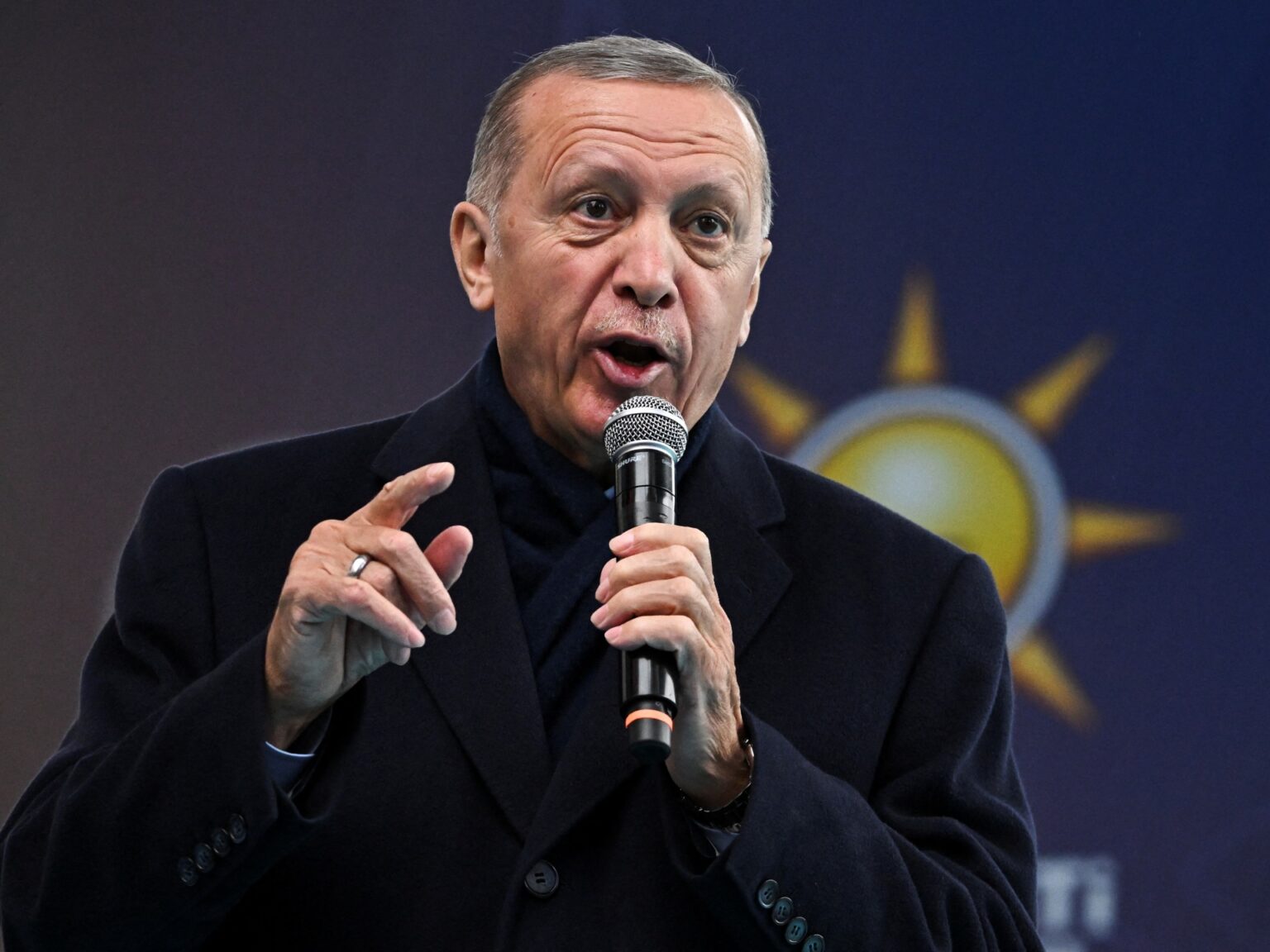Global Courant 2023-05-14 08:05:53
Istanbul, Turkey – As his country teeters on the brink of its centenary, Turkish President Recep Tayyip Erdogan has framed the next 100 years as the “Century of Turkey.”
The May 14 elections could be summed up in similarly apt terms: either an extension of Erdogan’s two decades of rule, or a government promising to return to a parliamentary system from the current executive presidency.
The presidential and parliamentary elections are regarded by many as the most important since Turkey held its first fair multi-party vote in 1950, also on May 14.
They come against the backdrop of a cost-of-living crisis that saw inflation peak at 85 percent in October and earthquakes in February that killed more than 50,000 people in the country.
Erdogan, who came to power in 2003, offers a vision for further development and pledges to continue the improvements made by his government from the Adalet ve Kalkınma Party (Justice and Development, AK Party).
It is the second national election under the presidential system that concentrated power in Erdogan’s hands.
Erdogan’s challenger
The opposition’s main challenger, Kemal Kilicdaroglu, has promised further democratization and rolled back Erdogan’s “one-man rule” while tackling what he calls economic mismanagement.
“Perhaps this will be the most crucial election in the history of the republic,” said Bulent Kusoglu, deputy chairman of Kilicdaroglu’s Cumhuriyet Halk party (Republican People’s Party, CHP).
“There is also an awakening in society. With this awakening, if we are successful in the election, society will be in a much better place.”
AK Party MP Ravza Kavakci Kan also stressed the importance of the vote. “This election is especially important because we are currently at a pace where many very good projects are being brought to the public.”
“For the continuation of those projects and to offer new projects, especially to the youth, we work day and night to find solutions for the newer challenges that may arise. So from that perspective, this is a very important election.”
Opposition presidential candidate Kemal Kilicdaroglu at a rally in Bursa, Turkey on May 11, 2023 (Murad Sezer/Reuters)
Erdogan trailing in the polls
The latest polls show Kilicdaroglu leading Erdogan in the presidential race, which will be repeated in two weeks if none of the three candidates cross the 50 percent threshold. However, in parliamentary elections, the AK Party is expected to become the largest party in the Grand National Assembly.
The withdrawal of a fourth presidential candidate – Muharrem Ince from the Homeland Party – on Thursday is expected to translate into more votes for Kilicdaroglu.
Approximately 192,000 ballot boxes in 87 constituencies are open between 08:00 and 17:00 (05:00 and 14:00 GMT). Each of Turkey’s 81 provinces counts as a constituency, with the exception of Izmir, Bursa, Istanbul and Ankara, which are split into two or three constituencies.
Across the country, 60.7 million people are eligible to vote. Some 1.8 million Turkish citizens living abroad have already cast their vote in 73 countries or at the border gates.
The votes will elect both the president and 600 MPs for five-year terms. Parliamentary deputies are elected by proportional representation from party lists.
Political alliances
Political parties – 24 contesting the election – have generally formed alliances to survive. This allows smaller parties that fall below the national electoral threshold of 7 percent to enter parliament.
The AK Party has joined the Milliyetçi Hareket Party (Nationalist Movement, MHP) and the Great Unity Party of the far right, plus the conservative New Welfare Party, to form the Cumhur İttifakı (People’s Alliance).
Kilicdaroglu’s CHP is the largest party in the six-member Millet İttifakı (Nation Alliance), which consists of the nationalist İyi Party (Good Party), the conservative Saadet Party (Felicity Party), the centre-right Demokrat Party (Democrat Party) and two parties founded by former Erdogan ministers, the Demokrasi ve Atılım Party (Democracy and Progress, Deva Party) and the Gelecek Party (Future Party).
The pro-Kurdish Halkların Demokratik Party (People’s Democratic Party, HDP), which is fielding candidates under the banner of the Yeşil Sol Party (Green Left Party, YSP) over a lawsuit threatening its closure, is the main party in the Alliance for Labor and Freedom with the Türkiye İşçi Party (Turkey Workers’ Party, TIP) and several smaller leftist groups. It has endorsed Kilicdaroglu’s candidacy.
Two other alliances – the right-wing Ata Alliance and the Socialist Union of Forces – are also putting forward candidates.
Supporters of Kemal Kilicdaroglu, presidential candidate of Turkey’s main opposition alliance, cheer at a rally ahead of the May 14 presidential and parliamentary elections in Tekirdag, Turkey, April 27, 2023 (Murad Sezer/Reuters)
The voting process
Voters entering the polling booths hold two ballots and choose either Erdogan, Kilicdaroglu or Sinan Ogan, representing the Ata Alliance, for the presidency; they choose a political party on a separate ballot for parliament.
Both ballots are placed in the same envelope before being deposited in a ballot box. At the end of the day, the votes are counted at the polling stations and a report is sent to the local office of the Supreme Electoral Council (YSK). The president’s votes are counted first and by the end of Sunday there should be a clear indication of the leadership’s outcome.
The election process is closely monitored by volunteers, such as those from volunteer group Oy ve Otesi (Vote and Beyond), as well as party representatives, and turnout is usually high – 87 percent was reported in 2018.
Official observers keep a copy of the ballot paper from their polling station and forward it to political parties so that political parties can keep track of their own nationwide vote count. The CHP says it has recruited nearly 564,000 volunteers to monitor the polls.
In the 11 provinces hit by February’s deadly earthquakes, the Electoral Council has set up polling stations around temporary shelters for survivors. However, it remains unclear how many of the hundreds of thousands of voters who left the earthquake zone will return for the election.
The United Nations estimates that some three million people left the disaster area in the weeks after the earthquakes hit, mainly to other parts of Turkey. The Electoral Council says only 133,000 earthquake-prone voters transferred their votes to new addresses.
“There are a lot of unknowns that don’t become clear until election day,” said Berk Esen, an assistant professor of political science at Sabanci University in Istanbul.
“We don’t have hard data on how many people have left the earthquake zone. If they have not registered in their new residence, they will have to physically return to the earthquake zone on Election Day and that is not really a realistic possibility.”
Amid concerns that the AK Party could challenge an opposition victory, Erdogan on Thursday vowed to do “as democracy demands”.
“I believe in my country and those who don’t respect the result of the ballot box don’t respect the country either,” he said during a TV interview. He also proposed changing the current presidential race threshold from more than 50 percent.







